The book section of this blog has sat idle as I have been flooded with work and school, but now that my school part is over for the summer I have some time. As I have been working on a Civil War regiment history, I have focused primarily on that subject. So, my first installment here will be on Union soldiers and books pertaining to my research.
UNION CIVIL WAR SOLDIERS
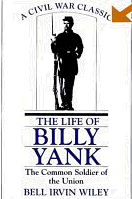 Life of Billy Yank: The Common Soldier of the Union
Life of Billy Yank: The Common Soldier of the Union
Bell Irvin Wiley
Wiley’s ground-breaking study (first published in 1952) had to be the starting point. Until his analysis, historians had largely ignored the average soldier. Wiley contends that Billy Yank and Johnny Reb were essentially not very different from one another. Wiley avoids deep ideological analysis of his subjects, but does advocate patriotism as a “deeper and more enduring†force for Union soldiers than Confederates. Wiley starts his narrative with recruitment and training. He skillfully highlights diaries and letters by the soldiers describing camp life, soldiering and fighting. He also raised the question that historians have since tried to answer, “Why did the men in blue go to war?†This on the surface may seem like a simple question to answer, but as we shall see it is not.
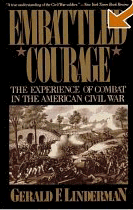 Embattled Courage: The Experience of Combat in the American Civil War
Embattled Courage: The Experience of Combat in the American Civil War
Gerald Linderman
Linerman’s study was my next stop. In his book, Linderman presents a thesis that is somewhat compelling and unique. He uses “courage†as an all-encompassing representation of Victorian era values for Union soldiers. Though courage was the “cement†of the army, its value and influence weakened and changed during the war. How the soldiers defined courage, how Victorian society valued courage, and how those beliefs changed by war’s end presented an arc that showed the rise and then redefining and ultimate disintegration and “disillusionment†of the belief system. In the end, the average Union soldier was simply trying to survive the war and make it home alive. Idealism and Ideology, according to Linderman, did not sustain the average soldier throughout the war.
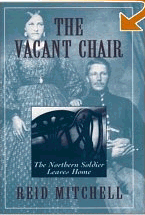 The Vacant Chair: The Northern Soldier Leaves Home
The Vacant Chair: The Northern Soldier Leaves Home
Reid Mitchell
Mitchell wrote another book ( “Civil War Soldiersâ€) that I read but will not discuss here. Mitchell presents an interesting and unique analysis of the Union solider and how his “ties†to home “influenced†virtually all aspects of a soldier’s relationship with the war. The transformation from boy to man, civilian to soldier, the “hardening†of combat, and identification with the values of the time that motivated them to fight. There were both hindrances and benefits to this ideological makeup of the Union soldier. Predominately, Union soldiers came from small rural communities. But it did not matter; values of home were consistent for most. This served as both motivation and spiritual support. Localism helped to create a nationalism that sustained throughout the war, according to Mitchell, who asks, “…wasn’t the Civil War a war over the meaning of home?â€
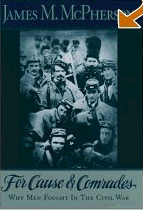 What they Fought For: 1861-1865
What they Fought For: 1861-1865
For Cause & Comrades: Why Men Fought in the Civil War
James M. McPherson
McPherson uses both qualitative and quantitative analysis and this is why I found his research convincing and accessible. “Convictions of duty, honor, patriotism, and ideology functioned as the principle sustaining motivations of Civil War soldiers,†concludes McPherson. It’s not ground breaking stuff, but being so far removed form that era, cognitive dissonance may not allow us to understand the historical context. McPherson found that 66% of the letters from Confederate soldiers and 68% of the Union soldiers expressed patriotic (ideological) motivations throughout the war.
Analysis of diaries and letters, let alone newspaper correspondences, is problematic. As most historians, including McPherson, point out Civil War soldiers almost always are descriptive rather than reflective in their writing. This causes for qualitative analysis or interpretation as opposed to quantitative discovery. Only by reading their letters and diaries can the historian come to understand combat motivation, ideological belief, and cultural influences.
McPherson acknowledges that there was a weakening of conviction, but among most soldiers there was never a disintegration of ideological beliefs.
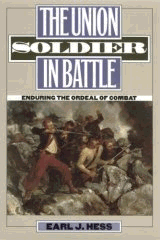 The Union Soldier in Battle: Enduring the Ordeal of Combat
The Union Soldier in Battle: Enduring the Ordeal of Combat
Earl J. Hess
The last book I wanted to highlight is Hess’ in-depth exploration of the soldier in battle. As Hess (and others) points out, soldiers marched off to war with a naïve understanding of what, at the time, modern warfare was going to be like. There was a “gulf†of experience that separated the common soldier from the realities of battle. Civil War battlefields were far different than European ones. They usually took place on fractured landscape consisting of small open fields, surrounded by trees and thick brush. This often led to confusion, sometimes panic, and always great fear. European battlefields typically were located on vast fields where both sides could see for miles and maneuver more effectively. Hess takes you inside the mind of the soldier giving the reader some compelling descriptions of battle. How they described the sounds, smells, and events of battle. Hess also touched on ideology and its implications on the fighting. All in all, an excellent book and one I recommend.
IN CONCLUSION
Consistent themes are in all of these books, some of which overlap: 1) Virtually everyone in 1861 completely misunderstood what combat would be like; 2) Ideology was, at the very least, the main reason why soldiers volunteered and most likely sustained them throughout the war; 3) Right of passage, volunteering and going off to war was equated with manhood. But also, they saw themselves, both North and South, as defending the ideals and traditions of 1776; 4) Union soldiers fought for a cause, though what that cause was continued to be redefined (perhaps constricting and/or expanding) as the war progressed.
A friend is searching for info about six Civil War soldiers found by treasuere hunters and reinterred with honors…where? When? supposedly recently. I thought you might help witht the research. My friend is Rita Sexton, reetz630@hotmail.com